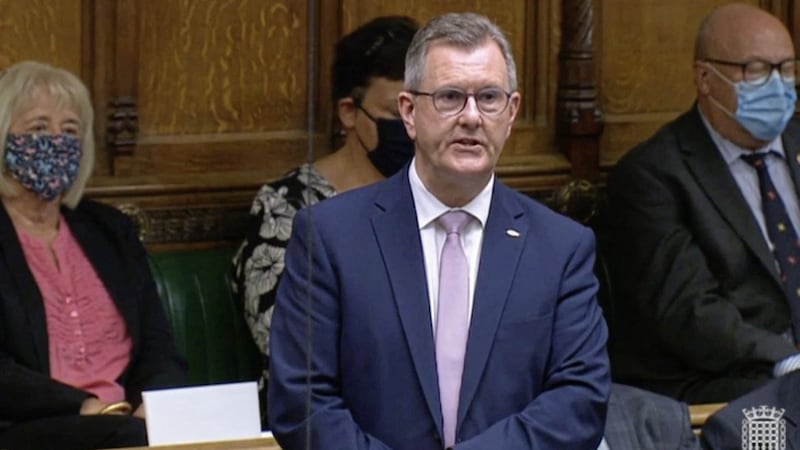Jeffrey Donaldson’s plea to help Afghan refugees, supported by the rest of the executive, has not come out of the blue. Rather remarkably, the DUP leader was involved in talks between the former Afghan government and the Taliban, which began in 2012, with what now seems the poignant hope of NATO withdrawal by 2015. Donaldson and SDLP founder member Denis Haughey were flown to Kabul by the UK government to advise participants. They travelled as chair and board member of the Causeway Institute, which went on to arrange ‘conflict resolution workshops’ in Afghanistan the following year. Causeway is one of three companies Donaldson has founded over the past decade with SDLP, Alliance, Sinn Féin and other DUP politicians to sell peace process expertise around the world. Two firms are still active, including Causeway, although it changed the ‘Institute’ to ‘Initiative’ in its name last month after Companies House warned the title is reserved for charities.
The international peace industry was an audacious turn for Donaldson’s career after years of disrupting the UUP in objection to the Good Friday Agreement. His latest move may cause some disruption inside the DUP, which still will not comment on one of its councillors wading into a refugee row in Carrickfergus.
**
Sinn Féin was quick to condemn republican youths in Derry for putting offensive and sectarian symbols on a bonfire, yet the party had no condemnation of pro-IRA chanting that same evening by thousands of young people at the Féile finale concert.
Unionists and loyalists did condemn the chanting, yet none will be spurning the ‘bonfire diversion’ cash split between Féile and loyalist areas. Pro-IRA chanting is a feature rather than a bug of this DUP-Sinn Féin carve-up: it balances the books for any projects ‘linked’ to the UDA and UVF.
Féile could rise above much of this by no longer having the Wolfe Tones play Celtic Symphony. The principle of curtailing the song’s performance has already been conceded: Féile FM banned it years ago for fear of losing its licence.
**
Northern Ireland’s big taxi operators have broken their industry by casualising the workforce through contracted self-employment, like internet firms such as Uber, while lobbying for convoluted licensing requirements to obstruct firms like Uber. The epidemic has finally brought this regulatory contradiction to a head, with drivers retiring or getting other jobs and refusing to return. So operators are now lobbying for licensing requirements to be relaxed to quickly employ new drivers, or more accurately not employ them. A media campaign is highlighting the impossibility of obtaining taxis at weekend closing time, as if that has not long been the case.
All this spin is aimed at SDLP transport minister Nichola Mallon. She needs to ignore it and ensure drivers are hired on proper terms.
**
Average house prices have risen 9 per cent in a year here to £153,000, according to all sales registered through Land and Property Services (LPS). If only sales through estate agents are considered, the average is £195,000 - a more representative figure for ordinary owner-occupiers. The Covid property boom is such a bizarre phenomenon, people are starting to ask when we will get the inevitable bust. It could still be some way off if the last boom is any guide. At the peak of the property madness in 2007, the LPS-type average alone hit £225,000. As Ulster Bank economist Richard Ramsey has calculated, that is £303,000 in today’s money.
**
Fumes from one of the Strangford ferries are causing health problems for crew, according to trade union Unite. The problem with the Strangford II vessel is exhaust pipes at water level: other ferries are as polluting, even if their fumes blow away above the crew’s heads.
This story raises the great unmentionable of cruise liner pollution in Belfast, which is on a different order of magnitude. One large ship emits as much nitrous oxide as half a million cars, as much particulate matter as one million cars and as much sulphur dioxide, almost unbelievably, as 375 million cars - more than all the cars in Europe.
Liners can at least be prevented from idling their engines in port by running power cables to the quayside. Although Belfast Harbour has ambitions to do this at its new liner terminal, the standardisation problems are formidable and need worldwide cooperation to solve.
Everyone is glad to see the liners back but we need somewhere to plug them in.
**
In a satisfying tale of bureaucratic humiliation, Covid fines are to be refunded to Black Lives Matter protesters who should never have received them. The PSNI had issued a ‘computer says no’ statement claiming it could not refund the £60 fines as the Covid regulations contain no mechanism to do so. However, nothing in the regulations prevents the police from calling up the Courts Service and begging it to send the protesters back their money, which is clearly what happened as panic gripped PSNI headquarters. This is a perfectly-timed reminder of the common law principle of liberty: everything is allowed unless specifically banned, rather than banned unless specifically allowed.









